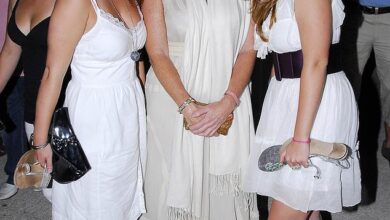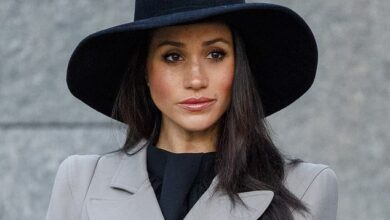Meghan and Harry’s bishop says it’s good to be woke: Minister who led prayers at the Sussexes’ wedding calls for ‘race action plans’ amid claims of racism in the church
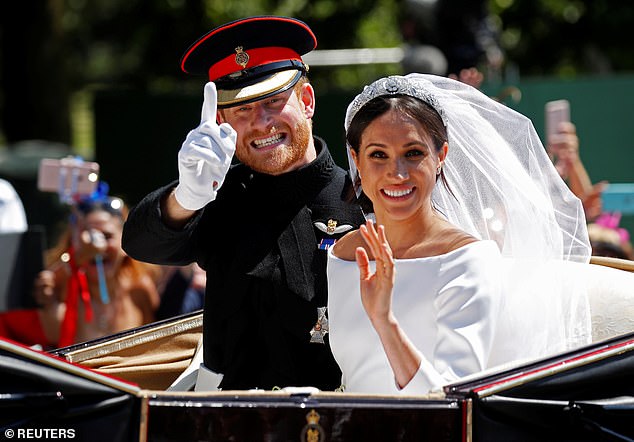
A black bishop who led prayers at Harry and Meghan’s royal wedding has declared it is good to be ‘woke‘ – amid claims of racism plaguing the Church of England.
The Rt Rev Rose Hudson-Wilkin, the Bishop of Dover, has insisted the British religious body must ‘further embrace racial justice’ and show no fear being called ‘woke’.
Pro-Black Lives Matter supporter Bishop Hudson-Wilkin, who was involved in the Duke and Duchess of Sussex‘s 2018 wedding, is drawing up a ‘race action plan’ calling on the CofE to up the number of ethnic minorities in senior church positions.
‘Those who are frightened by the authenticity of this movement want to scare us into thinking that being woke is a sin created by people on the Left,’ the Kent-based religious leader said.
The General Synod, the church’s legislative body, passed a motion on Sunday – put forward by Bishop Hudson-Wilkin – that said it should ‘encourage parishes and deaneries to develop local action plans to address issues of racial injustice.’

Rt Rev Rose Hudson-Wilkin, who was involved in Prince Harry and Meghan Markle’s 2018 wedding (pictured), said it is good to be ‘woke’ as she leads a new diversity charge within the Church of England
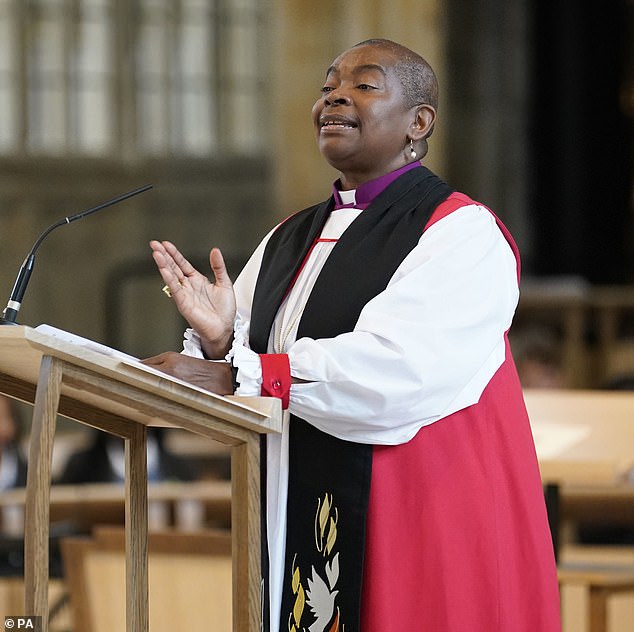
In her motion, the Bishop of Dover Rose Hudson-Wilkin (pictured) also called for better data collection to monitor diversity levels across parishes
It comes as members of the religious order opened up about the racism they had encountered during their lives.
Barrister Daniel Matovu, a lay member of Synod and a University of Oxford graduate, claimed he had been forced to bear a cross throughout his life ‘because of the colour of my skin’.
‘You white folks have no idea, particularly those of you who are white male, heterosexual and not disabled,’ said Mr Matovu, who attended the elite £48,998-a-year Eton College private school as a boy after moving to the UK from Uganda.
‘You’ve only been given small sticks to carry, with which to beat the rest of us.’
David Hermitt, another lay member, said the CofE must become more taken a firmer stance in tackling racism to reverse its falling membership figures because ‘young people’ are ‘more radical than we are’.
But Dr Rakib Ehsan, the author of Beyond Grievance: What the Left Gets Wrong About Ethnic Minorities, claimed ‘no sphere of British life’ was free of ‘divisive identitarian thinking’ including the CofE.
He told the Telegraph: ‘Abandoning traditional Christian values in favour of the unholy trinity of diversity, equity, and inclusion, the established Church of the land risks alienating conservative ethnic minorities who have little time for the politics of grievance and victimhood.’
The motion, filed by Bishop Hudson-Wilkin, also called for better data collection to monitor diversity levels across parishes.
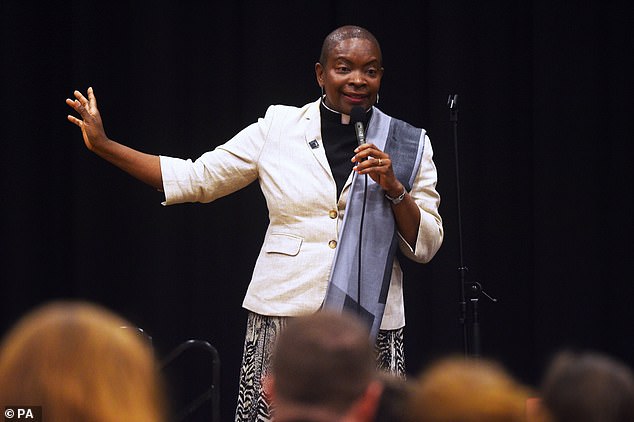
In a passionate speech to introduce her motion, the Bishop called for racial justice in the church’s governance structures to be strengthened
In a passionate speech to introduce her idea, the Kent port town religious leader called for racial justice in the church’s governance structures to be strengthened ‘in order to hold our church’s feet to the fire’.
She said she was in ‘no doubt that the church must continue to work at embedding racial justice in all its life and structures – lip service will not do, neither will ticking boxes’.
She told the Synod: ‘When it comes to the topic of racial justice, I’ve heard the word ‘woke’ being bandied about by many people including Government ministers, certain radio presenters, those in the media. And in every case, they’ve used it incorrectly.
‘The term woke originated in the USA, and it was a black terminology speaking specifically and directly to black people regarding the need to wake up and stay alert, to be consciously aware.
‘So it is not just a mere word, it is a movement. Those who are threatened by the authenticity of this movement, want to scare us into thinking that being woke is a sin created by people on the left.’
The Archbishop of York, Stephen Cottrell, said there has been some learning in the church from historical wrongs but added: ‘I continue to lament, because what we have done has not been good enough and that is a scandal and an affront to God.’
He told the gathering: ‘Today, we discuss racial justice. Tomorrow, we will think about how we move forward into the future in response to the church’s involvement in chattel slavery.
‘And all of this requires us to be honest about the terrible failings of the past, not to flinch from the failings and challenges of the present, and to build a better future.’
Mr Matovu warned institutional racism is ’embedded’ in the church. He said: ‘In this chamber, the vast majority of you are sitting next to and surrounded by other white people.
‘Across the church the general picture is the same – in your pews, on your PCCs [parochial church councils], deanery synods, diocesan synods, at every level up to and including the House of Bishops.
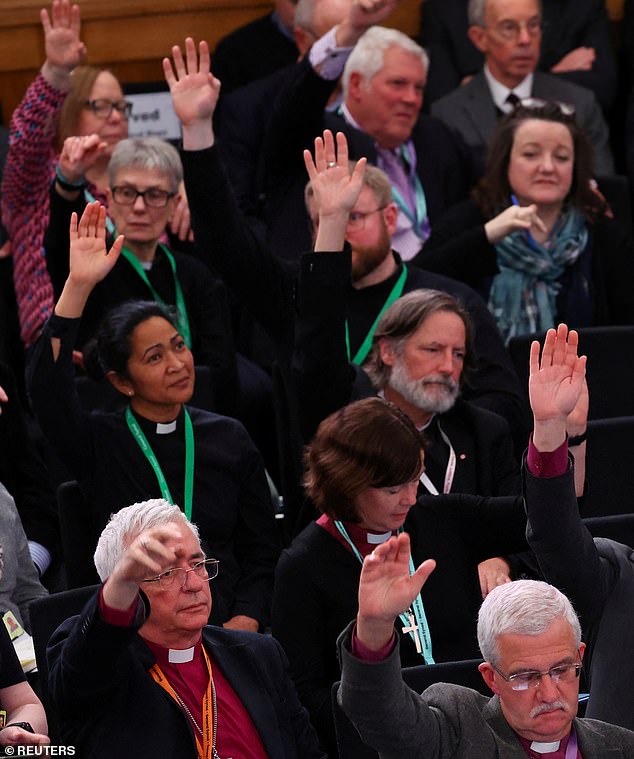
Delegates vote during the opening session of the Church of England General Synod
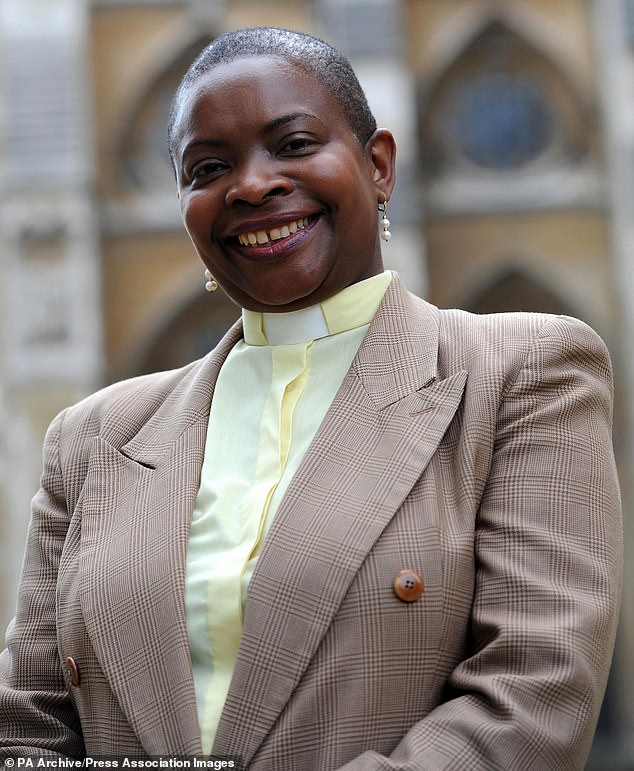
‘Those who are threatened by the authenticity of this movement, want to scare us into thinking that being woke is a sin created by people on the left’, the Bishop of Dover said
‘Institutional racism is deeply embedded in virtually every institution in this country, including sadly, in the life and culture of the church.’
It comes as Yvonne Clarke, who was the first black female deacon in the Church of England, is set to have a hearing in her appeal against what she has previously alleged to be a racist decision to dissolve her parish.
The hearing, before the Privy Council on Tuesday and Wednesday, will consider whether there was a failure to consult appropriately as required by the Equality Act 2010 and whether there was any indirect discrimination in the decision taken by the diocese which was upheld by the Church Commissioners, law firm Leigh Day said.
It follows cost-cutting proposals by the Diocese of Southwark, approved in September 2021, which would dissolve her parish and divide it between the parishes of St George, Shirley, and St John, Shirley.
Ms Clarke said: ‘I overcame the most upsetting racism when I first arrived in this area, from those who would not countenance a black woman priest.
‘My ministry and the work of my parish council has been to take the word of God into the entire parish, and to be prevented from those acts of inclusivity has been very harsh.’
Her solicitor Frances Swaine said: ‘My clients will demonstrate to the court how decisions were taken about their parish without adequate consultation and with insufficient due regard to the unique qualities that a black woman priest and a global majority parish council bring to an area of London with an ever-growing global majority population, especially serving the migrant and refugee community.
‘At a time when the Archbishop of Canterbury is spending much time talking about racism in the Church of England, my clients deserve to have had the special characteristics of their parish considered very carefully before any decision to get rid of them was taken.’
A spokesperson for the Church of England said: ‘It would not be appropriate for us to comment while the matter is subject to ongoing legal proceedings’


